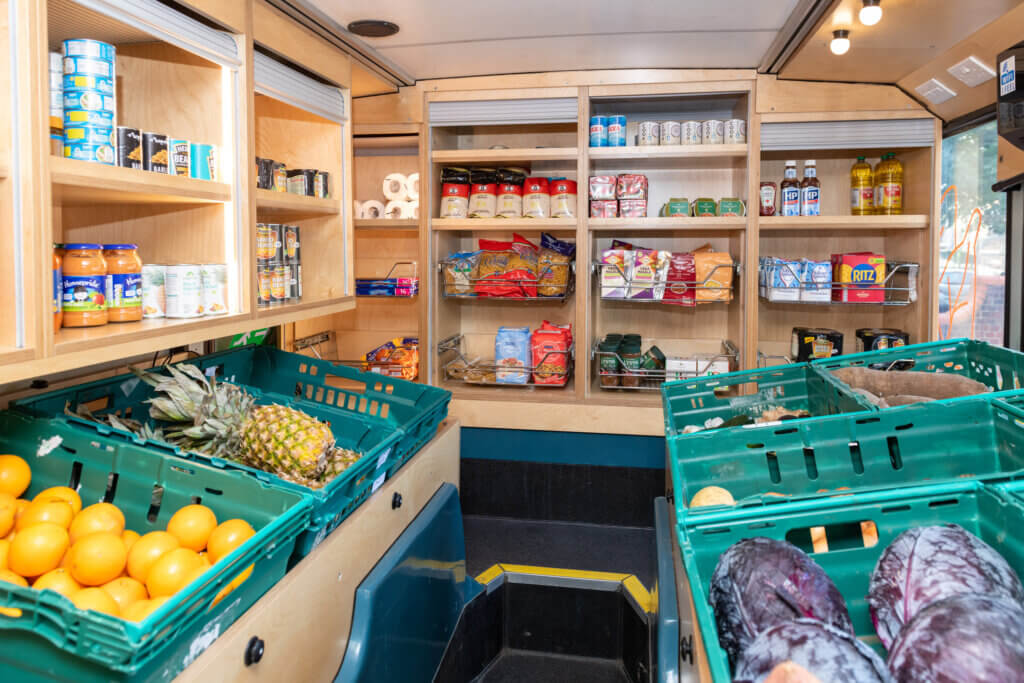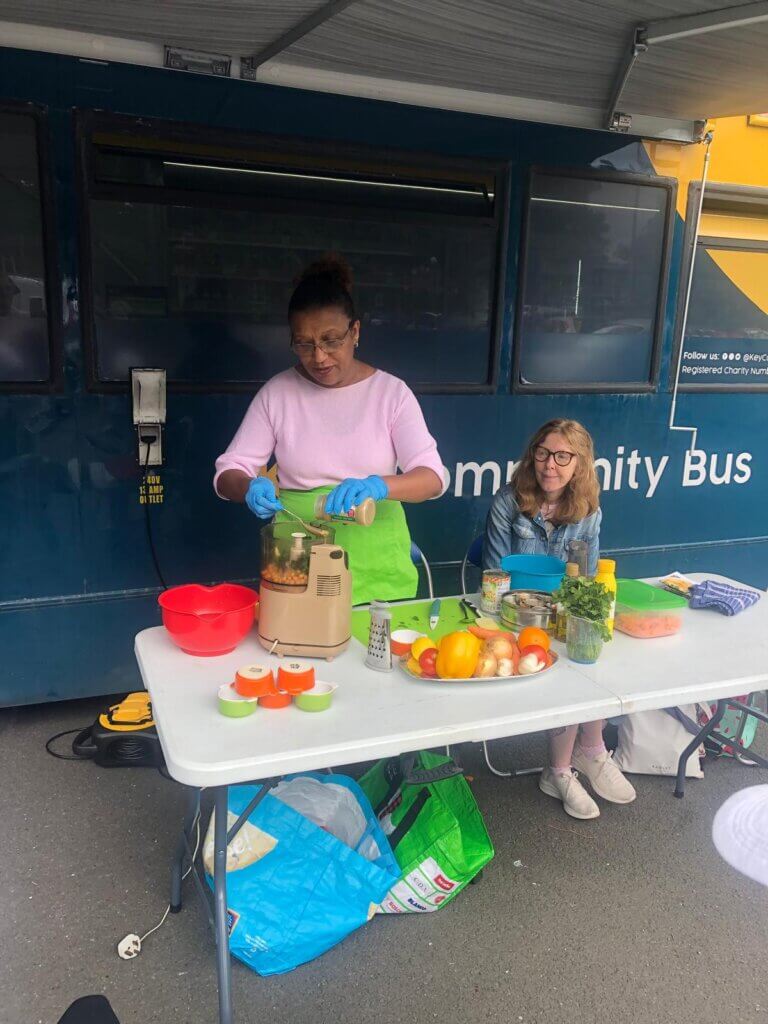
Written by Rachael Perret for Wicked Leeks.
Lucy Antal has a bee in her bonnet. As project manager for Queen of Greens social enterprise, a mobile greengrocer supporting communities across Liverpool and Knowsley, she sees countless health messages being sent out by public bodies and Government pledging to stop junk food advertisements or teach people how to cook.
“That’s marvellous,” she tells me. “But what are they actually doing about creating better access? That’s the starting point.”

The Queen of Greens bus, filled with fresh produce; Photo: © Rob Battersby
Over 7 million people in the UK were in food insecure households in 2022/2023 – that’s 11 per cent of the population. While the Cost of Living Crisis hasn’t helped, the simple fact that there’s a lack of stores selling fresh fruit and veg within walking distance is often cited as a major factor. If someone is a carer who’s short on time, an elderly person with limited mobility, a parent with young children, or can’t afford or access transport, it’s a significant barrier.
This lack of access is the key driver behind Queen of Greens, one of only a handful of mobile community projects in the UK driving into areas billed as food deserts. Also known as food swamps, these areas have limited access to affordable, nutritious, good-quality food. Or, as Lucy puts it, “it’s easier to buy a vape or put on a bet than it is to buy a piece of fruit”.
Food deserts are found across the UK. In rural areas, these are often created by lack of food provisioning infrastructure. But inner-city high streets are more likely to be filled with newsagents and off-licences selling crisps and chocolate than fresh produce.
Queen of Greens was set up a few years ago, but now they’re going greener, rolling out a pilot program with Bridging the Gap, an initiative by food and farming alliance Sustain. The aim is to offer affordable organic options to the communities they serve as part of efforts to increase good food access.
One of the first steps is to define ‘good food access’. Dr Celia Plender is a Lecturer in Anthropology at the University of Exeter who has spent more than a decade researching community food projects focussing on issues including access and sustainability.
Following a series of workshops with different stakeholders, including practitioners, academics, and consumers, she defines good food access as ‘Stable and dignified access to sufficient quantities of affordable, healthy, sustainable, equitably produced and culturally appropriate food for all that meets personal needs and preferences’.
“What I’ve always found working with community food groups is that they care about food access and food sustainability, but don’t find it easy to bring those things together,” Celia tells me. “They can feel irreconcilable, especially because of price, so people often focus on one or the other.”
Reconciling those is exactly what Queen of Greens and Sustain hope to do. The bus recently began selling organic potatoes, carrots, apples, bananas, onions, and some greens at non-organic prices. Sourcing from Manchester-based supplier Organic North also means they can incorporate more seasonal produce.
“We are working with people who don’t necessarily have a big income,” Lucy says, “We can’t justify buying strawberries in November when prices are through the roof. We’d have to pass that on to our customers, and that’s not fair.”
Price is a major factor in increasing access to healthy food. While food inflation is slowing, the cumulative impact from the past few years means food prices were 24% higher in March 2024 than in March 2022. What’s more, data from The Food Foundation shows that families in food insecure households buy less fruit and veg in favour of more affordable but nutrient-deficient foods.
Aiming to reduce this barrier, Sustain is covering the price gap between organic and non-organic produce. The team hopes this will give them useful insights into ways to make it possible for people on lower incomes to buy climate-friendly, nutritious foods.
To my mind, this is not rocket science; this is how we build health for the future. Food is the foundation for everything. And if we’re not able to provide our communities with decent food to start off with, then everything else falls apart around itLucy Antal, project manager, Queen of Greens
“Running an intervention like this enables us to understand what the price gap is, what the factors are, and how it leads people to change their habits if it’s made accessible and affordable,” Hannah Gibbs, Programme Manager for Bridging the Gap, explains.
“We can then start to make a more coherent case for the various interventions that would help us to support bringing that price gap down.
“Maybe that price gap is never going to reach total parity; I don’t know that that’s the expectation. The expectation is, how do you bring it down to a reasonable margin of difference that enables people to make those choices.”
Research shows that more people want access to pesticide-free, locally sourced, and ethically produced food. In fact, Sustain’s Marketing Organic: Consumer Insights Report (undertaken by Organic Research Centre and UK Organic with support from Sustain and If You Care) shows that people on low or middle incomes are just as likely to be leading the way in buying organic — “and that’s with existing price barriers,” Gibbs adds.
It’s one of several misconceptions that mobile food projects are challenging. Down in the capital, The Food Bus serves people across South East London who can’t access fresh fruits and vegetables or culturally appropriate foods.

The Food Bus, stocked with everyday essentials & fresh produce. Photo: © Be Enriched
The project’s COO, Karen Coulson, says we need to be careful not to jump to conclusions about people in food insecure households: “Just because someone might be struggling with food insecurity, doesn’t mean they don’t have food skills. They often know how to budget, they know how to cook. They’re coming to us because we can fill the gap with more nutritious, healthier food at a lower cost.”
Every week, the converted double decker bus and milk float make regular stops at leisure centres, primary schools, hospitals, and community centres, offering groceries and cupboard items at a lower cost.
In the last six months alone, they’ve had 1,600 customers – and that’s just people who bought something. There are also people popping their heads in to learn more about the initiative and residents who settle down on the top deck’s cafe space to have a chat with somebody.
There are other knock-on benefits, too. The buses become learning spaces where people can try fruit and veg they’ve never seen or cooked with before, often sharing tips and recipes with each other. Perhaps more crucial, though, is the social connection they facilitate, as Karen tells me.
“It’s not just a place for people to come and shop. People can stay and chat with neighbours and maybe just feel less lonely. It’s a vehicle and it’s food, but really it’s so much more. It’s about creating something that’s a place for community and connection.”
It’s a sentiment shared by the team at Key Community Bus, a mobile food service in South Tyneside operated by the charity, Key Community. Since launching in July 2023, the bus has been driving into areas of high deprivation, enabling people to buy fruit and vegetables on their doorstep.

Volunteers at the Key Community Bus, sharing food knowledge
The bus has 18 stops, including schools, churches, and even pub car parks, reaching some 1,000 families a week, and sells everything at a suggested donation price.
Jo Benham-Brown, the charity’s business and communities manager, explains that after 30 years of running a food bank, the bus has given people a dignified option for using their limited funds.
“We believe that everybody has the right to food, and it should be shared,” she says. “It’s a human right to have access to quality food, and if you’re not in possession of the means to do that then it’s right that other people who are should help you access that food for you and your family.
“It’s important that we do our bit to lift people out of poverty, raise their aspirations, and give them opportunities as well as feed them.”
These buses are, quite literally, vehicles for change. But they do have their limitations. For one, the buses are liable to break down, are expensive to run, and require generous funding. They’re also in their infancy, so there’s limited data on their impact.
But by working closely with suppliers, gathering feedback from customers, and evaluating pilots like Bridging the Gap, each project hopes to increase their reach and ultimately give people the ability to live a dignified and healthy life.
“We are learning hard lessons as we go,” Lucy says. “But if we don’t try, it’s never going to change.
“To my mind, this is not rocket science; this is how we build health for the future. Food is the foundation for everything. And if we’re not able to provide our communities with decent food to start off with, then everything else falls apart around it.”
Lead image © Be Enriched.